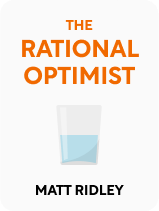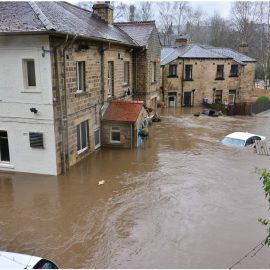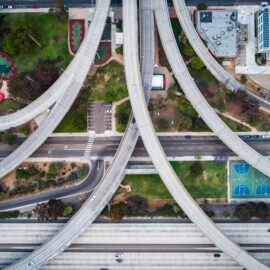

This article is an excerpt from the Shortform book guide to "The Rational Optimist" by Matt Ridley. Shortform has the world's best summaries and analyses of books you should be reading.
Like this article? Sign up for a free trial here.
What’s The Rational Optimist about? What would’ve happened if we never discovered free trade?
In The Rational Optimist, Matt Ridley writes that such a cross-pollination of ideas would have been impossible without free trade and the exchange of goods. This is because when we trade goods, we create networks of knowledge that reach beyond local communities and nations—allowing innovators to build upon each other’s work.
Read below for a brief overview of The Rational Optimist.
Overview of The Rational Optimist
In The Rational Optimist, Matt Ridley writes that the human capacity for innovation—through the spread, exchange, and blending of ideas—has been the main driver of humankind’s progress and prosperity. This penchant for innovation, unique to humans, has driven the advances in technology, culture, and political organization that have made today’s society healthier, wealthier, and safer than any in human history.
In his book, he explores:
- How the exchange of ideas and knowledge has fostered human prosperity
- How trade promotes stable societies
- How our capacity for innovation provides a case for optimism on climate change
- Why free trade is the best way to promote growth and prosperity
| Critical Reaction to The Rational Optimist The Rational Optimist drew a range of responses from critics and publications upon its release in 2010. While celebrating Ridley’s optimistic take on the future, The Wall Street Journal noted that Ridley’s stance in favor of minimal regulation of corporations might not sit well with all readers. The review cited Ridley’s dismissal of climate change and his skepticism of increased regulation of business as stances that would likely polarize readers. The New York Times was positive about the book’s extensive and detailed history of trade but criticized Ridley for making unsupported leaps in his arguments about the market’s power. Specifically, the review argued that Ridley overstated the power of trade and improperly cast it as the impetus behind all of humanity’s advances. The review also noted that Ridley glided over the fact that the sharing of physical goods and the sharing of ideas often happen independently, thus calling into question his thesis of trade as the primary mechanism for the exchange of ideas. A review in The Guardian appreciated Ridley’s success in tracing the impact of trade from early hunter-gatherers to the present, praising Ridley’s thesis as a compelling explanation for human advancement. However, the review also pointed out weaknesses in Ridley’s arguments, particularly his rationale for his blanket distrust of government. The publication found Ridley’s antigovernment stance reductive, dogmatic, and unsupported by evidence. |
Part 1: The Power of Human Knowledge Sharing
Ridley writes that humans’ distinguishing characteristic is our penchant for exchanging and accumulating knowledge. We don’t merely hoard knowledge; we share, combine, and build upon it. Ridley writes that what makes us distinct as a species is our shared intelligence—a body of wisdom that grows and evolves as we pass it along. In this section, we’ll explore this idea in depth, explaining:
- How cultural evolution enables our ideas to build on one another
- How trade has been the primary mechanism for this cross-pollination of ideas by enabling individuals and groups to develop specialized skills
Cultural Evolution Enables Our Ideas to Build on One Another
Ridley defines cultural evolution as the process of ideas interacting, cross-pollinating, and, most importantly, improving. Cultural evolution occurs when people in a society exchange and modify their ideas, beliefs, and technologies with those of people from other societies. Over time, ideas evolve, blend, contrast, and build upon each other. And, writes Ridley, this interplay of ideas generates solutions that are stronger and more advanced than their original forms—delivering an abundance of material resources, cultural achievements, and new levels of human health and happiness.
For example, around 3000 BCE, the Sumerians in Mesopotamia developed irrigation techniques that enabled them to cultivate crops year-round in the fertile but arid region. As trade routes expanded, they exchanged wheat and barley for crops like dates and sesame from neighboring regions. They also exchanged knowledge about water management and crop rotation. This knowledge improved agricultural practices and increased food production, which directly improved the health and longevity of the population.
Trade Facilitates Cultural Evolution
Ridley writes that trade and exchange are the key facilitators of cultural evolution. Through trade, humans opened the door for ideas to spread, mix, and evolve beyond geographical and cultural boundaries. According to Ridley, before societies began trading, each group had to be self-sufficient, producing or procuring everything they required independently. This not only limited their resources but also confined their ideas and knowledge within their physical boundaries. When trade networks emerged, however, people could exchange goods, ideas, and practices between diverse cultures and regions.
Trade Leads to Specialization (benefits of specialization)
In addition to cultural evolution, Ridley emphasizes another key benefit of trade: specialization. According to Ridley, when societies engage in trade, individuals can specialize in activities where they have a competitive advantage.
Before trade, every individual or community needed to master all skills necessary for survival. This approach wasn’t efficient, writes Ridley, because it dissipated the efforts and time of each individual and community across a wide array of tasks, each requiring a different skill set. For example, before trade, a single community might have needed to cultivate crops, hunt, weave clothing, and construct shelters. According to Ridley, the dawn of trade ushered in a dramatic change. If one community was adept at farming and another excelled at tool-making, they could each specialize in these tasks and trade their surplus with each other.
Trade Leads to Agriculture and Civilization
Trade, according to Ridley, provided the impetus for agriculture—and agriculture became the cornerstone of settled civilization. Here’s how it happened.
Before agriculture took root, humans were largely hunters and gatherers. This lifestyle didn’t require them to stay in a fixed place. But trading required a meeting place and often benefited from proximity to other communities and stability. Thus, humans began to live in larger, long-term communities near trading spots—the beginnings of cities and settled civilization.
Moreover, writes Ridley, these burgeoning communities required a steady food supply. Hunting and gathering was unpredictable and unable to meet the growing demand. This problem spurred our ancestors to develop agriculture. They discovered that they could grow plants and breed animals on a large scale. The steady, localized food supply created by farming was ideal for supporting the consistently populated trading communities.
This became a positive feedback loop as farming, in turn, accelerated trade. Once people began to grow crops or rear livestock, they produced more food than they could consume. The surplus could then be traded for other necessities and luxuries. This led not only to the growth of these early communities but also to increased specialization, as people began to focus more on producing specific goods for trade.
Part 2: Trade Promotes Stable, Open, and Cooperative Societies
In the last section, we explored Ridley’s primary argument that trade—and the resulting exchange of ideas—has been the main driver of human growth, advancement, and prosperity. In this section, we’ll look at how trade fosters a stable, open, and cooperative society based on transparency, accountability, and respectful interaction between individuals and groups. In particular, we’ll explore:
- How trade promotes trust, cooperation, and goodwill among strangers
- How trade strengthens free political systems
Trade Promotes Trust
Ridley writes that free exchange isn’t just an economic activity; it’s a potent force that promotes trust, cooperation, and goodwill among humans—contributing to social cohesion and harmony.
According to Ridley, exchange and trade create trust and boost relationships—even among strangers. This is because trade thrives on fairness, mutual benefit, and repeat transactions. If you’re consistently dishonest in your exchanges, word will spread, and other traders will avoid dealing with you. That works against your self-interest as your opportunities for trade (and the benefits it brings) dry up.
Thus, the self-interest of profit and advantage in trade naturally encourages trading partners to be truthful and respectful with one another. Moreover, the necessity to forge new partnerships calls for you to expand your good reputation outside immediate kin and into an extensive network.
Trade Promotes Political Freedom
Ridley posits that the trust and mutual respect that trade promotes also bolsters political freedom. Through trade, people see the mutual benefits of cooperation over conflict, which can translate into a greater willingness to resolve political or social conflicts through dialogue and compromise rather than coercion or violence. These are cornerstone values in democratic societies.
Ridley also writes that in a thriving, open economic system, wealth (and thus, economic power) is typically more dispersed, leading to a diffusion of political power. For example, in a market town where multiple small businesses flourish, wealth is distributed among many entrepreneurs and workers rather than concentrated in the hands of a few. This broad-based economic empowerment translates into a more democratic distribution of political power, with a larger proportion of the population having the means and incentive to participate actively in local governance and decision-making processes.
Part 3: We Shouldn’t Rush Toward a Green Energy Transition
Now that we understand why free trade has been a powerful driver of human progress throughout history, we’ll explore Ridley’s response to one of the main challenges facing humanity: climate change. He urges caution and restraint in response to climate change, arguing that we should fully consider the risks of reacting too hastily or zealously in our efforts to mitigate the effects of a warming planet. In this section we’ll explore the core of Ridley’s argument against an overreaction to climate change, looking at:
- How fossil fuels have played an indispensable role in driving humanity’s prosperity—and why we’ll continue to rely on them to propel global economic growth
- The high costs and potential negative consequences associated with a transition to green energy
- The capacity of innovation and technology to address the consequences of climate change
In Defense of Fossil Fuels
Ridley writes that fossil fuels have played a key part in propelling human prosperity, particularly since the onset of the Industrial Revolution. He asserts that without the power of coal, oil, and natural gas, we wouldn’t have many of the advances we take for granted today. It was the energy from coal that powered the steam engines and factories of the Industrial Revolution, marking a historic shift from agrarian societies to industrialized ones. This energy source allowed for significant increases in productivity, which, in turn, drove economic growth and improved living standards.
Further, Ridley points out that developing countries in particular still rely heavily on these resources to fuel their economic growth. Calls for the swift abandonment of fossil fuels frequently come from developed countries that have already reaped the benefits of industrialization. However, these calls often neglect to acknowledge the stark economic implications for developing countries. With current technology and prices, trying to economically develop without the use of fossil fuels, at least in the early stages, could consign these countries to a future of poverty and stagnation.
There Are Major Costs to a Green Energy Transition
Ridley further writes that climate pessimists pay too little attention to the costs and potential economic downsides of a transition to greener sources of energy. According to Ridley, the transition to renewable energy sources has been slower and costlier than enthusiasts often acknowledge, and renewables have been unable to match the yield of fossil fuels. Moreover, harnessing renewable energy requires significant infrastructure, land, and resources. As a result, implementing these projects can lead to unintended consequences such as disruption of ecosystems or competition for land use.
Ridley adds that governments around the world would need to invest massive subsidies to make renewable sources competitive—and that this would distort market forces. This is because the cost of these subsidies is shared among all taxpayers, while the benefits, such as reduced energy bills or profits from generated green energy, primarily go to wealthier citizens who can afford the initial investment in expensive equipment like solar panels. Thus, the poorest people end up subsidizing green energy for the wealthiest.
Technology and Human Innovation Can Address the Climate Crisis
Ridley sees humankind’s boundless capacity for innovation and exchange of ideas as our secret weapons in dealing with changing climate. He writes that pessimists underappreciate the technological solutions we’re capable of inventing. As we comprehend more about our changing climate, our technological responses will become increasingly efficient and targeted. Advances in energy capture, storage, and distribution will mitigate the impacts of climate change. This includes our ability to sequester carbon by removing CO2 from the atmosphere and securely storing it in different reservoirs including forests, soils, oceans, or underground formations.
Part 4: The Case for Trade Over Aid
Having established the benefits of the free exchange of goods and ideas, and the powerful role that our capacity for innovation will play in the fight against climate change, Ridley makes the case against foreign aid to developing countries. In this section, we’ll explore his argument in detail, including:
- Why developing nations suffer from deep-seated problems that foreign aid can’t address—and might make worse
- Why economic growth through free trade offers a better path forward than foreign aid for developing countries
Foreign Aid Can’t Fix Developing Nations
In discussing the problems developing nations face, Ridley focuses on Africa (where today’s extreme poverty is disproportionately concentrated), where he argues that foreign aid may not only be ineffective but could potentially make existing issues worse. According to Ridley, Africa’s challenges are deep-rooted and systemic. Corruption, political instability, lack of infrastructure, weak rule of law, and internal conflicts are just some of the issues faced by many African nations. These complex problems won’t be solved by infusing money into the continent.
Ridley contends that large influxes of foreign aid can inadvertently make these problems worse. Aid money often falls into the hands of corrupt leaders and officials, failing to reach the people it’s meant to help. The abundance of free money with little accountability can undermine incentives for good governance and transparency and instead further entrench a cycle of corruption.
Consider the case of Haiti, which has received substantial amounts of foreign aid, especially following the devastating earthquake in 2010. Despite intentions to rebuild and develop Haiti, large portions of aid have repeatedly been mismanaged. This influx of aid with inadequate oversight provided a ripe environment for corruption. It created few incentives for local leaders to establish good governance or transparency, as they knew they could rely on continuous external financial support. With corruption deepening and development stalling, the aid intended to help Haiti recover instead contributed to a cycle of dependency and governance issues, hampering long-term sustainable growth.
Free Trade Is a Better Path to Prosperity
Ridley argues that free trade is the primary engine of development for developing countries. Ridley reasons that when countries freely exchange goods, services, and ideas, they promote competition, leading to better quality goods and services at lower prices. Trade also provides access to a wider range of products and technologies that might not be available locally. Lastly, as we’ve explored in Part 1, it encourages specialization, fostering economic efficiency and innovation.
For example, consider South Korea’s transformation from a war-ravaged country in the 1950s to one of the world’s leading economies today. Initially, South Korea received significant amounts of foreign aid. However, when South Korea embraced policies that favored economic liberalization and free trade in the 1960s and 1970s, these policies led to rapid industrial growth. They created millions of jobs and substantially raised the standard of living. The increase in local production and exports fostered economic resilience and significantly reduced the country’s reliance on foreign aid.

———End of Preview———
Like what you just read? Read the rest of the world's best book summary and analysis of Matt Ridley's "The Rational Optimist" at Shortform.
Here's what you'll find in our full The Rational Optimist summary:
- The connection between free trade and cultural evolution
- Why Matt Ridley defends the use of fossil fuels
- Why foreign aid can’t fix developing nations






